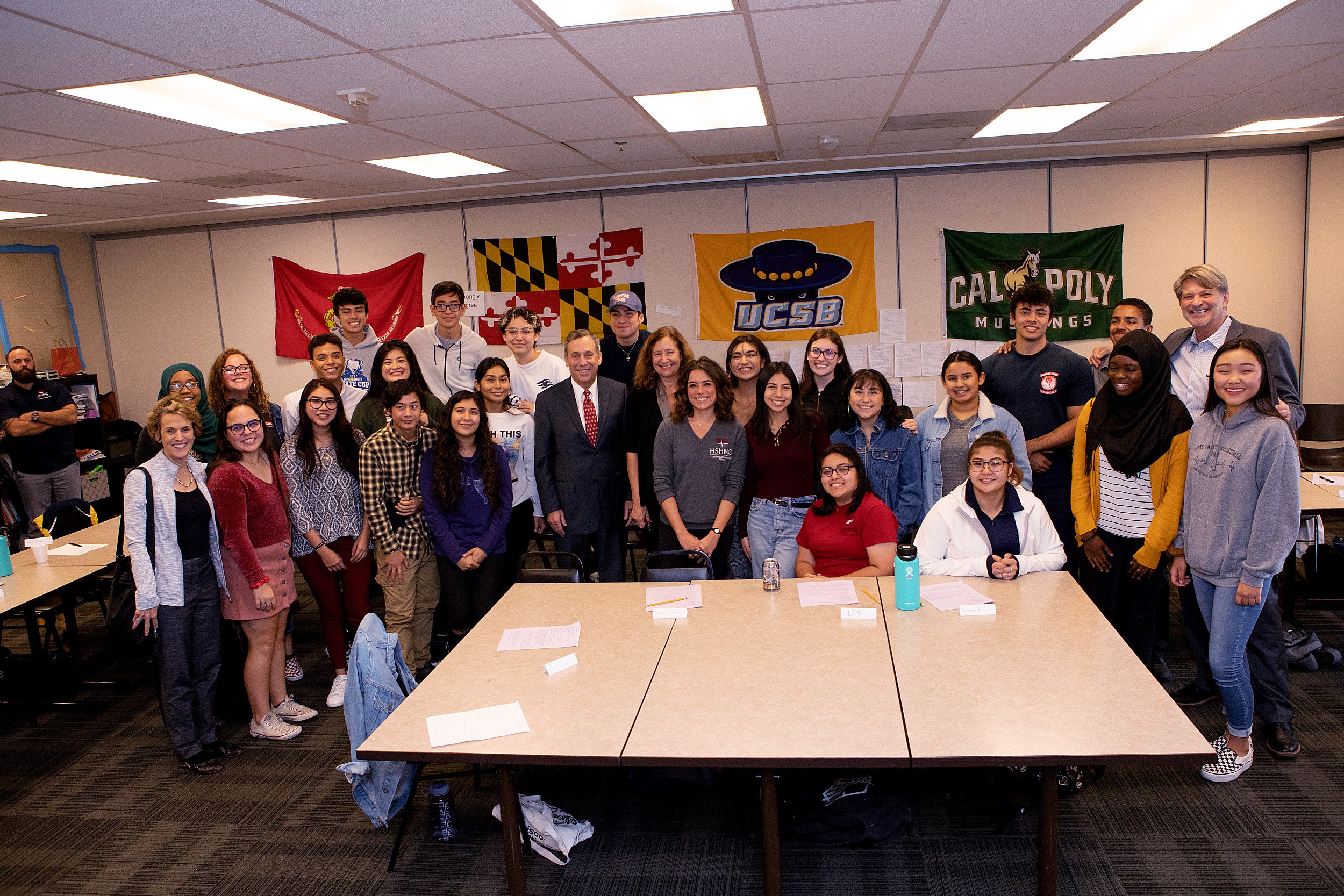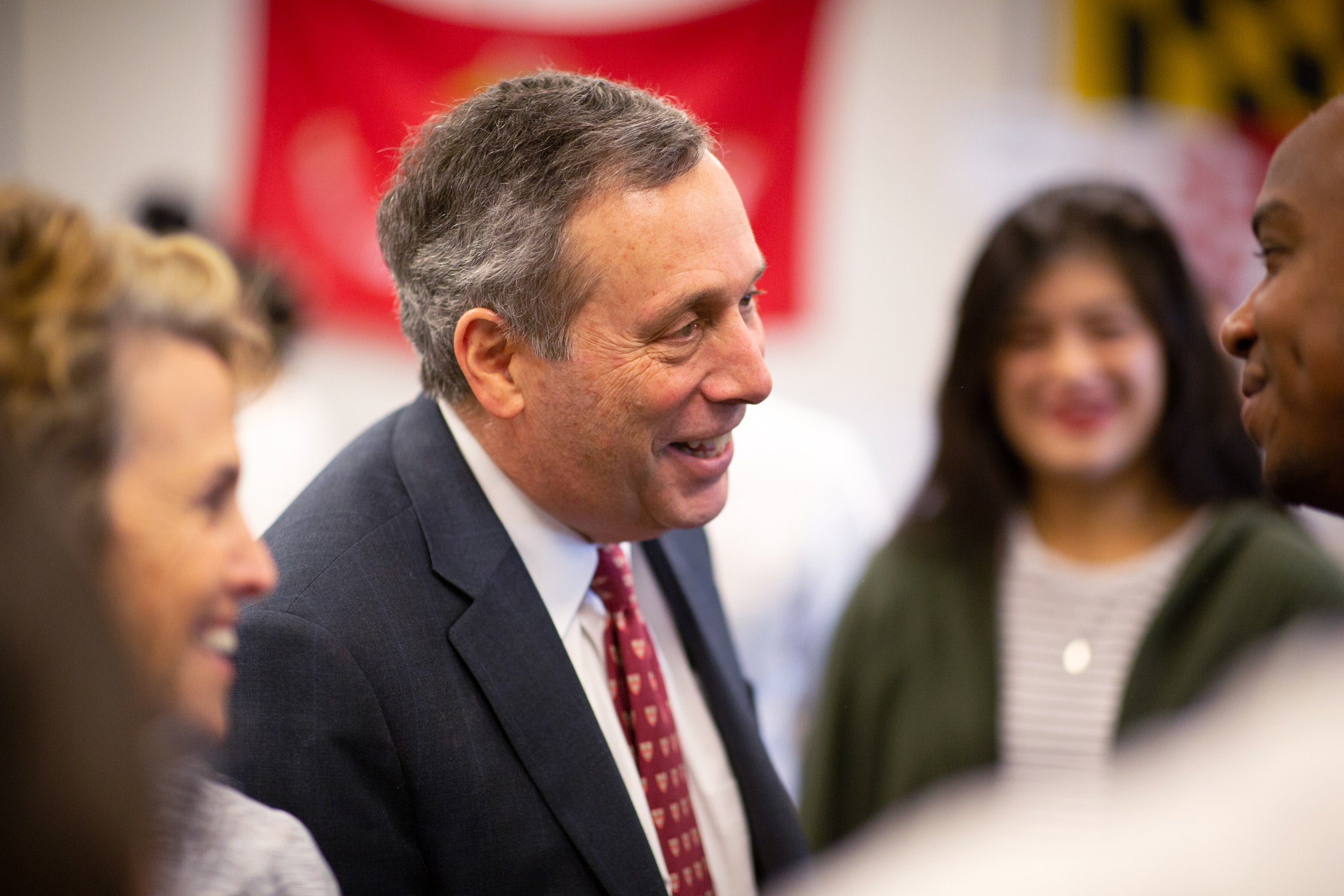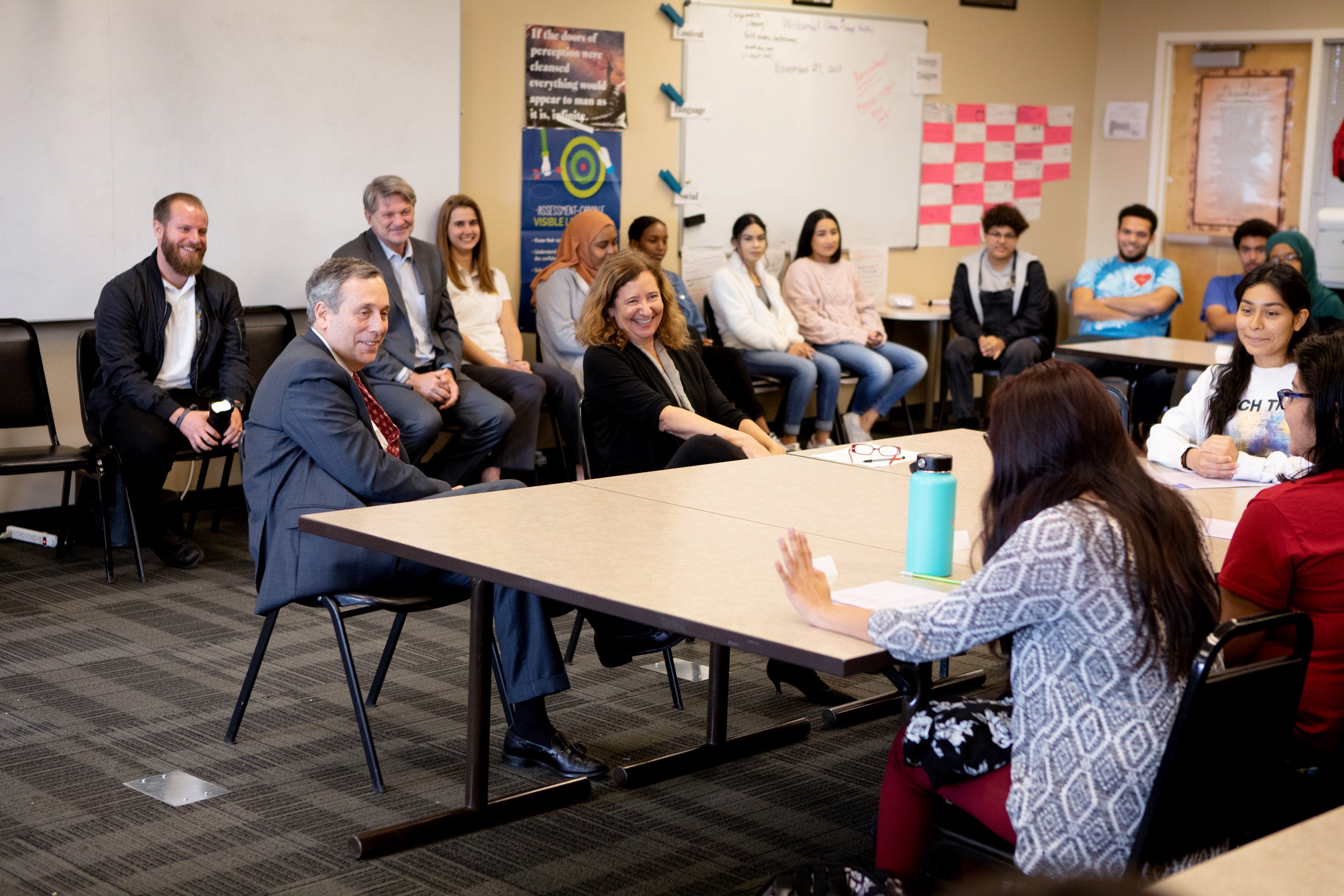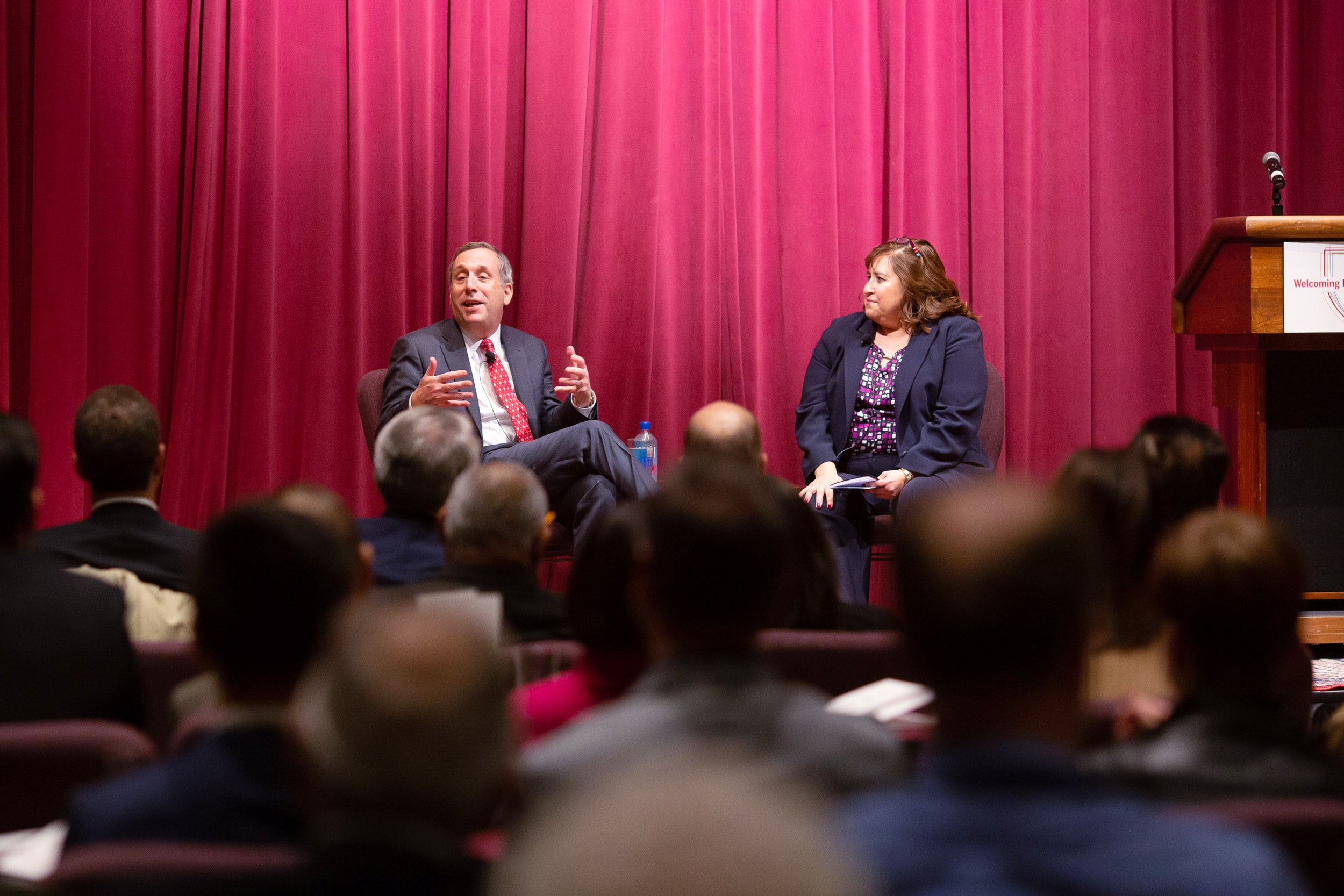
Harvard President Larry Bacow visited Health Sciences High and Middle College in San Diego last week accompanied by Professor Elisa New, who led a discussion on an Emily Dickinson poem.
Photos by Spark Photography 2018
In San Diego, Bacow stresses learning, New teaches poetry
Harvard president meets with alumni, tells high school students: ‘You can get a great education anywhere’
“You can get a great education anywhere. It’s a question of what you do with the opportunity,” Harvard President Larry Bacow told a group of high school students last week in San Diego. “At almost any college or university in this country, if you apply yourself, if you seek out the right people, you can get a great education.”
Bacow made the remarks when he visited students, teachers, and school leaders at Health Sciences High and Middle College in the City Heights neighborhood of San Diego last Friday as part of a two-day visit to the area.
Bacow also visited with more than 200 alumni from around Southern California at the San Diego Museum of Art in Balboa Park on Thursday evening.
In September, Bacow made a similar trip to Pontiac, Mich., meeting with high school students as well as alumni from the region. Bacow referenced his Pontiac visit while in San Diego and noted his eagerness to highlight and expand the ways Harvard and its alumni are engaged in positive ways in communities throughout the country.
One of Bacow’s goals in visiting the school was to learn from students, teachers, and leaders how Harvard content is being used in schools. He is interested in reactions to the program as he considers additional, creative ways that Harvard can be a partner and collaborator with educational institutions of all kinds.
At the school, about 20 students are enrolled in what they call “Harvard Poetry,” a course offered for credit through the Division of Continuing Education. Elisa New, Powell M. Cabot Professor of American Literature, developed the course as part of Poetry in America, a multiplatform digital initiative that brings the American literary canon into classrooms and living rooms around the world. New led a discussion on a poem by Emily Dickinson, taking questions from students more accustomed to seeing her through the digital course.
“I could never imagine a class at Harvard; I always thought it was out of reach for me,” said senior and course participant Martha Santana-Garcia. Santana-Garcia is in the process of applying to college and hopes to pursue teaching. “Seeing this really solidified my feeling about being a teacher because I saw how impassioned [Professor New] was, and I saw how happy my English teacher was.”
Bacow reflected on his own experience as a high school student, and the idea that college may be closer, and less out of reach, than it may seem. “I didn’t take an MIT [Massachusetts Institute of Technology] course when I was in high school,” he said. “But my calculus text was written by an MIT faculty member, George Thomas, and my physics text was written by a couple of MIT faculty members, so in something of the same way that you’ve been exposed to Harvard, I was exposed to MIT. So, aim high and don’t let anybody tell you that you can’t do what you want to do.”
Bacow also spoke to a larger gathering of students and teachers in a group community circle to discuss pathways to higher education and how universities and schools can create effective spaces and curricula for student success. As the group talked about the admissions process, Bacow gave students advice on transitioning from high school to college, telling them there are many people they can look to for help, including former classmates who have graduated, as well as guidance counselors.
One of those at the Health Sciences High event was Jordan Harrison, a 2018 alumnus of the Harvard Graduate School of Education who is now at Reality Changers, a San Diego nonprofit focused on helping guide underserved young people into college. “The school’s model is transformative in providing high school students the experiences of taking college courses and internships,” Harrison said. “After working with some of the students and hearing how the school had prepared them, I was excited to see how the College course was in action on a high school campus.”
Harrison called Bacow’s visit “a transformative experience for the students to demystify Harvard, to start to see Harvard as an opportunity that is possible.” He added, “In a room full of students of underrepresented backgrounds and first-generation students, it was powerful to see students share their poetry and thoughts on taking a Harvard class in high school.”


Bacow meets Jordan Harrison, a 2018 Graduate School of Education alumnus who helps guide young people into college through the San Diego nonprofit Reality Changers; Bacow and New visit Health Sciences High and Middle College.
Harvard’s role in the world and the value of higher education were some of the topics discussed by Bacow and San Diego County Superior Court Judge Yvonne E. Campos last week as part of an event at the San Diego Museum of Art.

Connecting with alumni
With a rainy city as backdrop Thursday evening, more than 200 area alumni, representing every Harvard School, gathered at the San Diego Museum of Art to hear from Bacow at a session sponsored by the Harvard Club of San Diego and the Harvard Alumni Association.
The evening’s highlight was a moderated conversation between Bacow and San Diego County Superior Court Judge Yvonne E. Campos, J.D. ’88. They spoke about Harvard’s role in the world and the enduring value that higher education offers to society. They covered a wide range of topics, from the impact of public service to developments in Allston to news about the admissions case to how Harvard is helping solve problems as diverse as global climate change and the opioid crisis.
During a Q&A session with the audience, Bacow noted the ways that Harvard is addressing the social and economic disparity facing the country. He explained, “We’re working in all sorts of different fields to try to ensure we’re using the expertise that’s represented at Harvard to address disparity wherever we find it.” He noted this work is happening in nearly every School.
“Being a Harvard alum is about building community and creating a social fabric that is distinctly Harvard,” said Vivian Fung ’98 of San Diego. “We all share a sense of the importance of education, the importance of creating opportunity, and the importance of working to help push society forward.” Fung said she felt confident that the University was helping to advance those goals under Bacow’s leadership.
As the discussion came to a close, Bacow said, “I would hope that we as an institution, collectively through our actions; could model what it means to be a caring community, to model what it means to be committed to making the world a better place; could model what it means to be, as I said in my inaugural address, ‘slow to judge and quick to understand.’ I would hope we could model what it means to recognize that with this extraordinary education that all of us have been privileged to receive comes responsibility, and it’s the responsibly to make the world a better place.”




